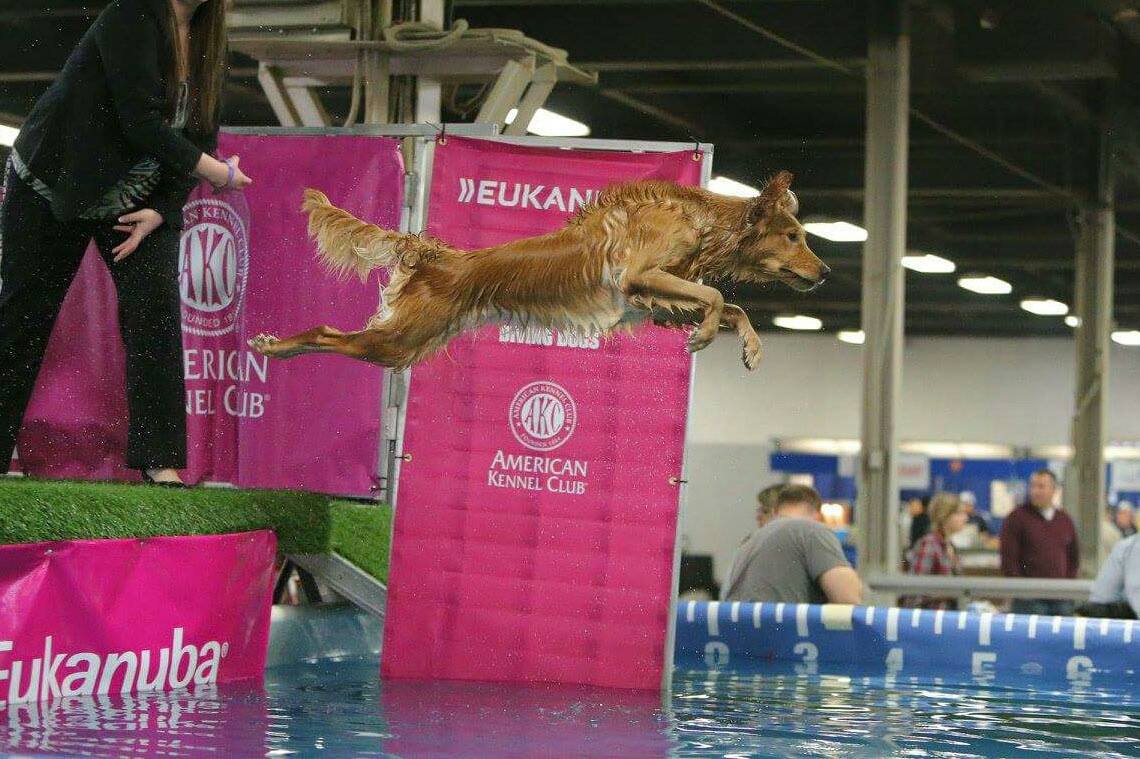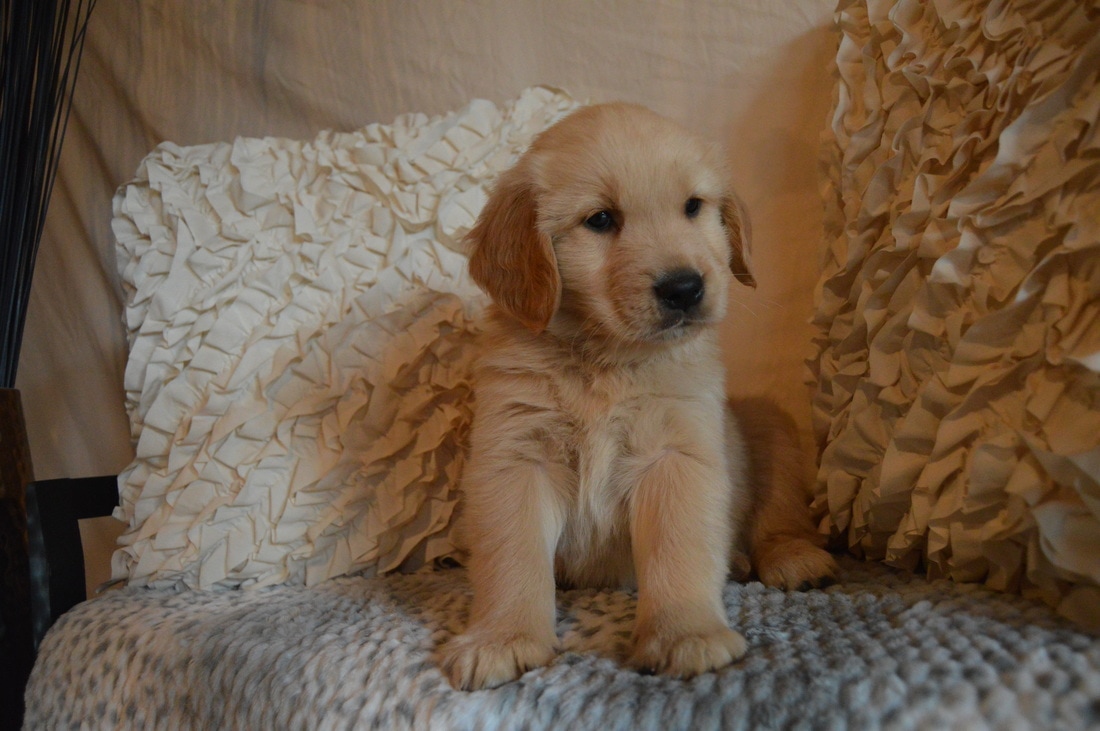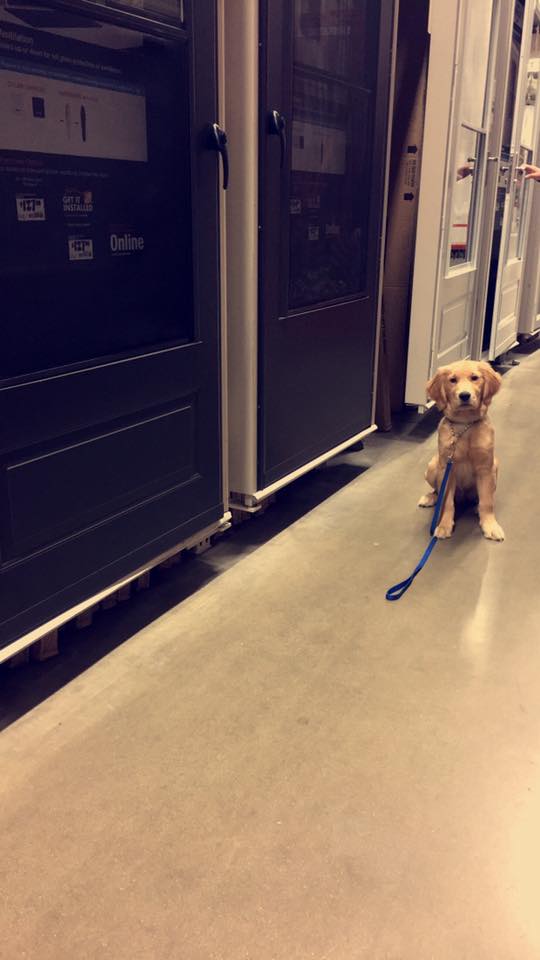Even Golden Retrievers Need SocializationSocialization is one of the most important jobs that every new puppy owner has. When you bring home one of our puppies, they have already been started on this process. We expose them to all kinds of noises, sights, and smells that they would normally encounter in the house. They are introduced to older, safe dogs of various breeds, and get to see cats and other types of animals. They have been handled extensively by multiple different people, and have gone on car rides and adventures. Our puppies have the added benefit of good genetics when it comes to temperament. All of our breeding stock is extremely social with both people and dogs, and they pass this wonderful temperament onto their puppies. The combination of good early socialization and good genetics means that your new puppy will be getting off to a very strong start. Once you bring the puppy home, you now have to continue through the next few months of the puppy's life. Introducing your puppy to a bunch of new environments, letting them see dogs of all shapes and sizes, and letting them interact with multiple different people will help ensure that your puppy will be confident with new experiences for the rest of his life. The most valuable socialization period is in time between 4-14 weeks. We'll cover the first 4 weeks of that period, and for our training program puppies, we will continue to provide them with lots of good socialization opportunities. For those who go home at 8 weeks old, here are 5 tips to help you get the most out of this window. 1. Respect Your Puppy's Own PacePuppies develop at different rates, and each one has different thresholds for new things. Some things that you introduce your puppy to, like friendly dogs and people, they will instantly find fun and interesting. Other things, like loud speakers or larger livestock, might make them nervous at first. Start working with your puppy at the threshold of when they are a little worried about something, and start turning that thing into something positive. Do focus work and feed the puppy around the environment or item of their concern, and get closer as their confidence begins to build. You will see that very quickly your puppy will be willing to approach with zero apprehension because they now associate the environment with a high level of reward and interaction with you. 2. Consider Your Puppy's Vaccine ScheduleAll socialization experiences should be fun and safe for your puppy, and part of that is making sure that your puppy does not get exposed to any diseases that they have not been vaccinated for. Waiting until the end of your puppy's vaccine series would mean that he was safe from all of these diseases, but would also mean that he missed out on the bulk of his early socialization window. There is a balance between keeping your puppy safe and still allowing him to get lots of new experiences. Make sure that all of the dogs that your puppy is meeting are vaccinated and healthy. Choose new locations to take your puppy that do not have very much dog traffic. You can take him into Petsmart later on once his vaccines are finished, but until then he should not be walking around on the floor there. Better options for a very young puppy would be places like pet friendly hardware stores, sportsman/outdoor type stores, and offices of friends who would let you bring a puppy over. 3. Not All Dogs Are Created EqualWhen choosing dogs for your puppy to meet, keep in mind the experience that you want him to have. Dogs that have shown aggression toward another dog, or even those who play rough, can cause your puppy to have a bad experience that he may generalize with other dogs. Any dogs that your puppy is meeting should be friendly, vaccinated, and they should play at a level that is appropriate for the puppy. Your puppy should also be meeting dogs of all shapes and sizes. A French Bulldog looks quite a bit different than a Doberman, and your puppy should see all kinds of breeds so that he can understand that dogs can come in many forms. Meeting small dogs is also very important, so that your golden retriever, who is going to be a big dog one day, respects that these are still dogs and not toys or prey items. A final note on socializing with dogs is to avoid dog parks with your puppy. The reason for this is two fold: disease and problem dogs. When you go into a dog park, you are going somewhere that hundreds of dogs have gone that same week. You do not know if those dogs were vaccinated, if they were dewormed, and many people do a poor job of picking up after their dogs in these parks. Furthermore, you do not know the temperament and training of the other dogs in the park. We have seen first hand the kind of damage that can occur when an overly pushy or aggressive dog comes into a dog park, and it happens all too often. There are many other options to have fun with your dog that are much safer. 4. Balancing Your Social ButterflyWith a puppy that is naturally social, your socialization process needs to include steps on keeping your puppy more interested in you than he is in the rest of the world. Our rule of thumb with our goldens is that the dogs should be able to greet and play with other people and dogs, but that they should come as soon as we call them and be able to stay focused on us even when their friends are hanging out around us. To create this kind of balance, take your puppy to new places and work on obedience and focus games while distractions are ongoing in the background. Gradually increase the difficulty level of this as your puppy gets older. 5. Make Sure Your Puppy Remembers His MannersYour socialization trips can double as a great time to work on generalizing good manners with all of the people that your puppy meets. Before you let someone pet your puppy, let them know that you are working on teaching him manners, and give them specific instructions depending on what you are working on. Do not allow your puppy to jump on people, and work on building a strong behavior for him to default to when being greeted. Typically we teach the puppy to sit for being petted, and this will help make your puppy a model citizen. Jumping and rambunctious greetings may seem very cute with a young puppy, but will be a nuisance when your dog is full grown. You can establish lifelong habits and behaviors at a young age and not have to fix issues as your dog moves through adolescence.
3 Comments
11/1/2022 06:11:07 pm
I'm glad you talked that you should consider the life you want to give for your puppy before having them. Last night, my cousin informed me that she and her husband were planning to have a dog that could live with them in their vacation home. She asked if I had any idea what would be the best option when choosing a joyful puppy. I appreciate this helpful article. I'll tell her it will be much better if she consults a trusted golden retriever puppies website as they can answer all her inquiries.
Reply
1/30/2023 10:08:31 pm
I'm glad you talked that you should consider having the right time for your pet to adjust to new things. Last night, my cousin informed me that she and her husband planned to have a dog that could live with them in their vacation home. She asked if I had any idea what would be the best option when choosing a joyful puppy. I appreciate this helpful article. I'll tell her it will be much better if she consults a trusted golden retriever puppies website as they can answer all her inquiries.
Reply
5/3/2023 07:41:48 am
Next week, our puppy arrives home, so we're learning about caring for a pup, and we'd love to know more about the importance of socializing with other dogs. It's great that you also talked about ensuring that your puppy isn't exposed to any diseases. We'll definitely follow your advice about finishing our puppy's vaccination series before taking him to meet other pups.
Reply
Leave a Reply. |
Archives
June 2017
Categories |



 RSS Feed
RSS Feed